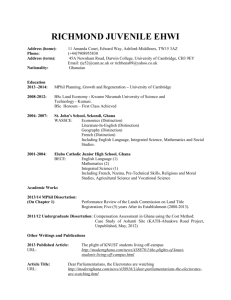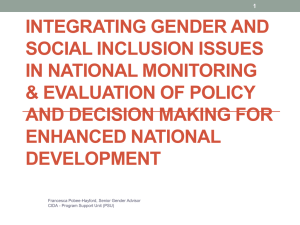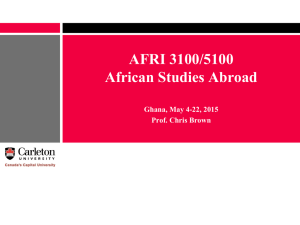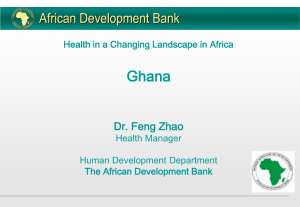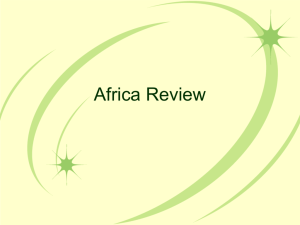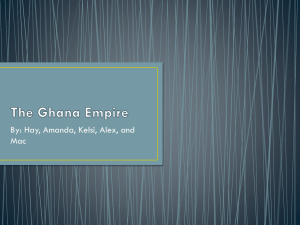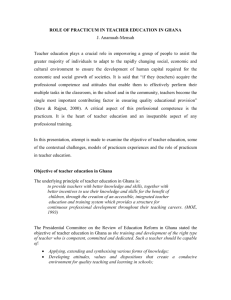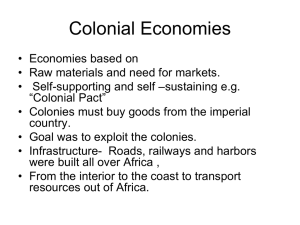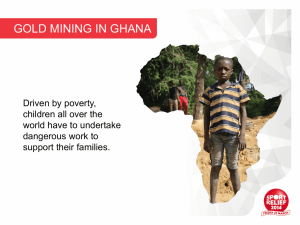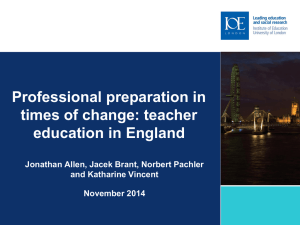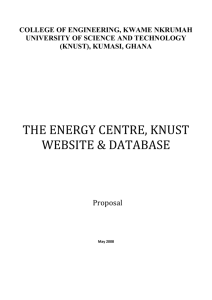Presentation by Dr Ben Mensah, University of Cape Coast, Ghana
advertisement
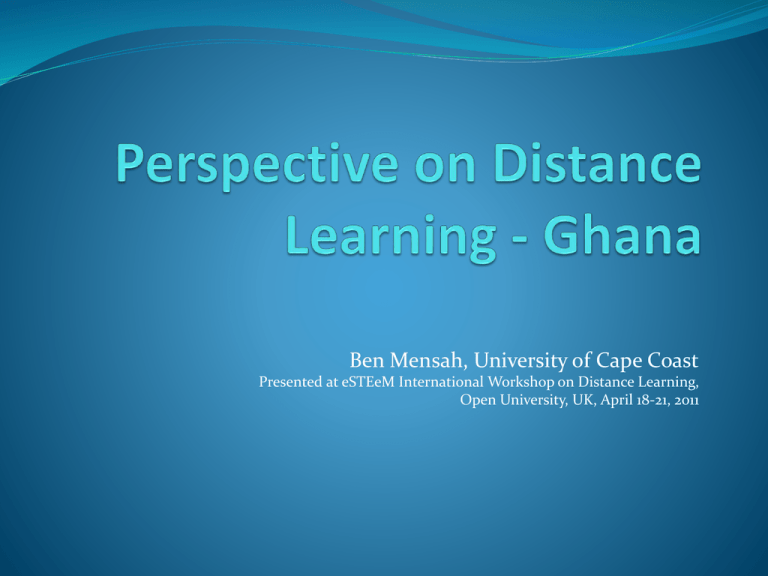
Ben Mensah, University of Cape Coast Presented at eSTEeM International Workshop on Distance Learning, Open University, UK, April 18-21, 2011 Outline Development of Distance Learning in Ghana – historical review Current State of Distance Learning Public Universities Other institutions Prospects and Challenges Background to DE in Ghana Immediate post-independence: ‘correspondence’ courses for academic and professional qualifications Offered by institutions outside Ghana – mainly the UK (Wolsey Hall, Rapid Results College) Subscription dropped in the 1970’s and ‘80s for economic reasons National need for Distance Learning As a viable alternative for manpower development especially in training of teachers Expansion of access to basic education For upgrading qualifications of teachers To expand access to university education Various attempts have been made to provide opportunities for distance learning at tertiary level Need for DE Assessment of DE needs: 1991-1994 the Commonwealth of Learning and UNESCO 4 public universities began preparations for distance delivery of programmes 1995: Government approves DE programmes to begin in all (4) public universities 1996: National Distance Education Council established 1997: Ghana Distance Education Association (GHADEA) inaugurated State of DE in public universities • Institute of Adult Education in 1970 • Established in 1970 • • 5938 students registered by 1976 Enrolment down to 12 by 1984 • Currently runs a diploma programme in Youth Development work for students in Ghana, Sierra Leone and the Gambia • As of 2009, had 4500 students The University of Cape Coast Centre for Continuing Education Established in 1997 to administer DE programmes First intake was 750 students in 2001 for Diploma in Basic Education UCC Currently runs: Diploma programmes in Business (Commerce and Management) Post-Diploma: Education and Business MEd IT Total no. of programmes: 14 Course on HIV / AIDS and associated stigma (with UG, UEW and SFU) UCC 2010/2011 – 10,500 admitted (cf. 5,081 residential) 43% female (35%) The current population of students is close to 30,000, with 32 study centres Completion rate average 77% between 2004 and 2009. Plans to build regional study centres / satellite campuses Staff- capacity-building programmes in place Centre for Continuing Education, University of Cape Coast, Ghana Student Support Resident tutors in all regions 1786 course tutors Bi-monthly face-to-face sessions Distance Education at UEW Administered by the Institute for Educational Development and Extension Established 1993, with financial support from the DfID (the ODA) Print-based DE programme began in 1998 with 198 students on 3 year post-diploma degree in Education Now runs diploma and post-diploma programmes in Basic Education and postgraduate diploma in mentorship UEW Have plans to start M.Ed. programmes Science, Maths and Language Education Current enrolment c. 23,000 Kwame Nkrumah University of Science and Technology Institute for Distance Learning (IDL) IDL started in 2005 8 study centres, one each in 8 of 10 regions Enrolment– 2575 (2009/2010) with c. 70% in 2 centres – Accra and Kumasi 2,288 admitted for 2010-2011 IDL - KNUST Programmes Commonwealth Executive Masters in Business Administration (CEMBA) Commonwealth Executive Masters in Public Administration (CEMPA) Proficiency Certificate in Architectural Draughtsmanship (PCAD) Other Institutions/Facilities Teacher Education Division, Ghana Education Service African Virtual University Kludjeson International (UNISA), West Africa Resource Centre (Leicester University) Besworld Company (OU) Challenges/Needs Staff training Development of course material Conversion of print-based to electronic instructional material Equipment for electronic delivery Practical work in Science Perceptions of parity of qualifications obtained through distance and conventional programmes Conclusion Significant advances made in Distance Education Ghana in the last decade Opening up access to tertiary education, freeing learners from the constraints of time and place and offering flexible learning opportunities. A number of challenges need to be overcome for further development of DE Thank you Acknowledgments These sources of information are acknowledged: Ahiatrogah P.D., Mabenga, M.B., Brew, E.D., Adu, S. and Asabere-Ameyaw A. (2006). Overview of Distance Education Programmes in Ghana. Presented at Workshop on Modern Distance Education and Network Education for African Educators, Jilin University, Changchun, Sept. 2-21 Centre for Continuing Education, University of Cape Coast (CCEUCC) KNUST website - http://idl.knust.edu.gh/ http://www.knust.edu.gh/pages/news.php?siteid=knust&id=342 UG Website - http://www.ug.edu.gh/ W.H.K. Hordzi - University of Education, Winneba (UEW)
